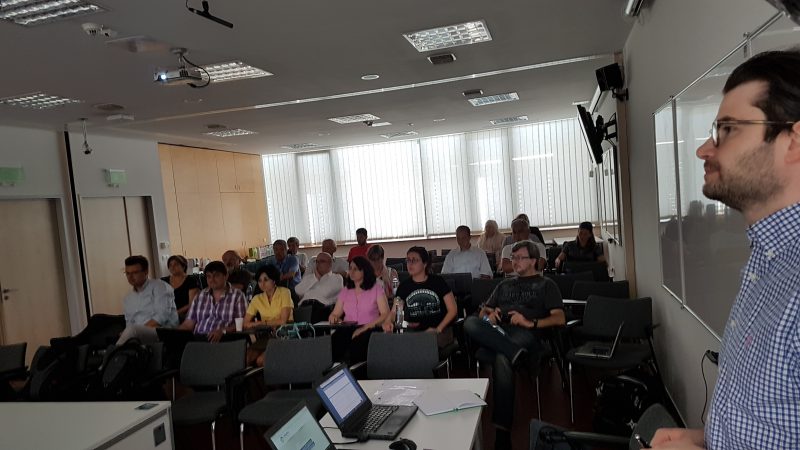The closing conference took place on 30/08/2017 in Gyor, Hungary. The venue of the plenary session was the meeting room of the Engineering Doctoral School (room UT 230). More than 20 lecturers from all the consortium partners gathered to reflect on the project’s activities over the last two years.
In his opening speech, Laszlo Komlosi, the vice-rector for International Relations of the Széchenyi István Egyetem
Széchenyi István University, welcomed all the participants with some encouraging words about the INNOSOC project.
Following the introductory words from the vice-rector, Vedran Podobnik, the INNOSOC’s project manager, presented a report containing information about project’s timeline and achievements.
Just before the lunch break, the following representatives of partner institutions gave presentations on how did the project impact their institutions and students:
- Ignac Lovrek
University of Zagreb - Felipe Penaranda Foix
Universitat Politecnica de Valencia - Birgit Graf
Hochschule fur Telekommunikation Leipzig - Szilvia Nagy
Szechenyi Istvan University, Gyor - Svetla Radeva & Filip Tsvetanov
University of Telecommunications and Post, Sofia - Peter Marton
University of Zilina - Catherine Sable
Institut Mines Telecom – Telecom Bretagne - Lubomir Dobos
Technical University of Kosice - Istvan Polgar
University of Oradea - Marianna Zichar
University of Debrecen - Krassimira Mantcheva-Baykova
Technical University – Sofia.
The second part of the conference was about the upcoming TEAMSOC21 project, fully entitled as “The ICT Engineer of the 21st Century: Mastering Technical Competencies, Management Skills, and Societal Responsibilities. Vedran Podobnik and Jurica Babic, the steering committee members of the INNOSOC project, explained the peculiarities related to TEAMSOC21. Goran Martinovic introduced University of Osijek – FERIT, the latest addition to the consortium and, consequently, the new partner in TEAMSOC21.
In short, TEAMSOC21 retained all the key features from INNOSOC that proved to be positive for the resulting intensive study program:
- target societal challenges defined by Europe 2020 and Horizon 2020 programs;
- include intercultural topics to work on societal challenges from different perspectives;
- include ICT as a key horizontal topic; and
- utilize blended mobility approach for effective collaboration among supervisors and students.
In contrast to INNOSOC where the focus is placed on innovation, the core topic in TEAMSOC21 is entrepreneurship, meaning, students are expected to obtain not only engineering skills and knowledge but also skills and knowledge related to management, entrepreneurship, and societal responsibility. To achieve this, students will be put in a start-up environment, meaning, student groups will seek to answer societal challenges by stimulating experiences from start-up companies.








Recent Comments